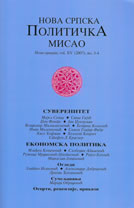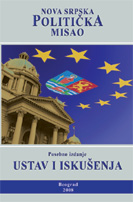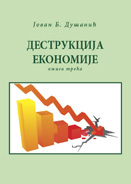| NSPM in English | |||
United Russia |
 |
 |
 |
| nedelja, 20. jun 2010. | |
|
(The National Interest, 8.6.2010)
Putin met with Iranian President Mahmoud Ahmadinejad and Turkish Prime Minister Recep Tayyip Erdogan on the margins of the “Interaction and Confidence-Building Measures in Asia” conference, an 18-nation gathering originally launched by Kazakh President Nursultan Nazarbayev. Ahmadinejad also used the opportunity to praise Turkish leaders for their strong statements in Turkey’s ongoing confrontation with Israel over nine deaths during Israel’s commando attack on a Turkish-sponsored flotilla seeking to break Israel’s blockade of Gaza. The Russian Prime Minister’s participation in the summit was in itself striking, in that Medvedev usually represents Moscow in security fora—foreign policy and national security are his constitutional responsibilities, with Putin in charge of the economy. Yet today Medvedev was in the Russian capital, discussing the importance of regional support for children’s summer camps and ordering the government to prepare proposals to reduce the number of federal bureaucrats while Putin discussed Iran sanctions and the recent Turkish-Brazilian proposal for a nuclear fuel swap. According to the Kremlin web site, Medvedev’s next scheduled trip is not until June 10-11, when he is to attend the Shanghai Cooperation Organization summit in Tashkent, Uzbekistan. The problem for the Obama team is that Russia’s constitutional division-of-labor between president and prime minister is not so clear as it might seem—especially when the prime minister is an energetic and capable former president like Putin rather than a technocrat with no independent political standing, as most of Russia’s previous prime ministers. Mr. Putin appears to take a rather broad view of his responsibility for the Russian economy that includes a significant foreign policy component. Putin indeed played only a modest role in the process that produced the new START treaty. But it is far from certain that he will play the same small part in sanctions on Iran, something that would have not only foreign policy implications but a domestic economic impact on Russia, including in the energy and defense sectors, perhaps the two most important parts of the Russian economy—and the two sectors that have received the most personal attention from the prime minister. During a visit to China last fall, Mr. Putin pointedly noted that any Russian decision to support sanctions would be taken not by President Medvedev but in the country’s Security Council, by a group including Medvedev, Putin, and many of Putin’s allies in Russia’s security and intelligence agencies. That Putin would reportedly want to discuss the Turkey-Brazil nuclear fuel exchange agreement with Erdogan and Ahmadinejad is especially interesting. First, of course, the Obama administration strongly opposes the deal, despite the Brazilian view that President Obama had in fact encouraged it in a letter to Brazil’s President Luiz Inacio Lula de Silva later leaked to the media. Russian support for the agreement would clearly undermine U.S. efforts to secure U.N. sanctions. Second, however, is the fact that Moscow was disappointed that Tehran appeared to accept but later to drop a similar Russian proposal last fall that would have provided Iran with 20 percent enriched uranium for a research reactor in exchange for much of Iran’s existing uranium supplies (enriched to a lower level). Is Putin looking for a Russian role in the Turkey-Brazil deal that would benefit Russia’s nuclear industry and stave off sanctions on Iran? If so, it could quickly put the “reset” into the deep freeze—many Americans are counting on Russian support for sanctions as the central payoff for the administration’s efforts to work with Moscow and its apparent softening of U.S. policy toward Russia in the former Soviet region and central Europe. It is difficult to know at this point why Prime Minister Putin went to Istanbul and what he discussed there. Whatever the purpose of the trip, however, it does not seem to be “in perfect lockstep” with President Medvedev or with preparations now underway for an Obama-Medvedev summit in Washington just two weeks from now. If the Obama Administration really wants the U.S.-Russian relationship to succeed—rather than just providing photo opportunities that could be an asset now and a liability in 2012—U.S. officials should think long and hard about their relations with Russia’s Prime Minister. Paul J. Saunders is Executive Director of The Nixon Center and Associate Publisher of The National Interest. He served in the State Department from 2003 to 2005. |
Ostali članci u rubrici
- Playing With Fire in Ukraine
- Kosovo as a res extra commercium and the alchemy of colonization
- The Balkans XX years after NATO aggression: the case of the Republic of Srpska – past, present and future
- Iz arhive - Remarks Before the Foreign Affairs Committee of the European Parliament
- Dysfunction in the Balkans - Can the Post-Yugoslav Settlement Survive?
- Serbia’s latest would-be savior is a modernizer, a strongman - or both
- Why the Ukraine Crisis Is the West’s Fault
- The Ghosts of World War I Circle over Ukraine
- Nato's action plan in Ukraine is right out of Dr Strangelove
- Why Yanukovych Said No to Europe

.jpg)








.jpg) Obama administration officials have focused intently on working with Russian President Dmitri Medvedev, both in the nuclear talks that led to the new START agreement and now in discussions of United Nations Security Council sanctions on Iran. And they have dismissed the idea that concentrating on Medvedev—at the expense of working with the more influential Prime Minister Vladimir Putin—
Obama administration officials have focused intently on working with Russian President Dmitri Medvedev, both in the nuclear talks that led to the new START agreement and now in discussions of United Nations Security Council sanctions on Iran. And they have dismissed the idea that concentrating on Medvedev—at the expense of working with the more influential Prime Minister Vladimir Putin—











